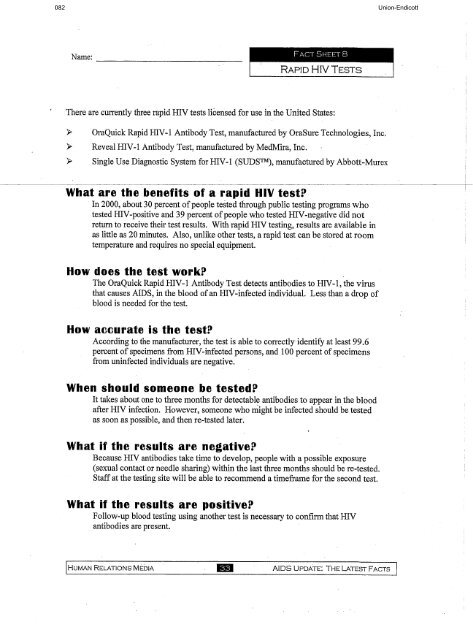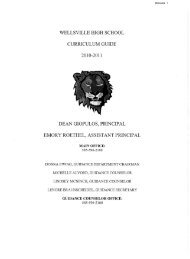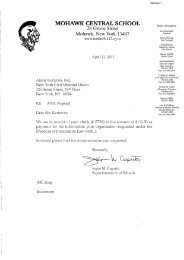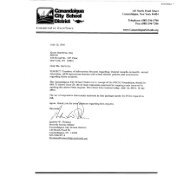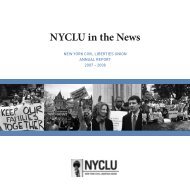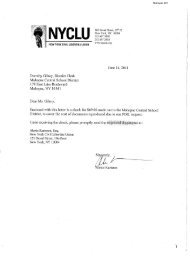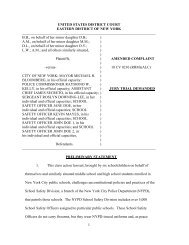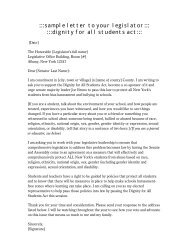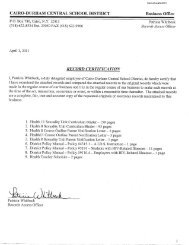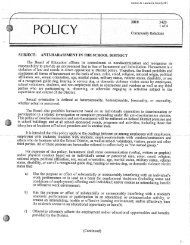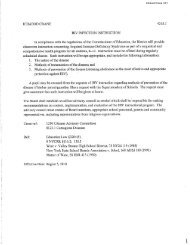- Page 1 and 2:
001 Union-Endicott Plans for Tuesda
- Page 3 and 4:
003 Union-Endicott T F DK 32. There
- Page 5 and 6:
005 Union-Endicott NAME DATE :li Mu
- Page 7 and 8:
007 Union-Endicott ÑAME DATE i ,1
- Page 9 and 10:
009 Union-Endicott WORKSHE." My Ris
- Page 11 and 12:
011 Union-Endicott \N1-IA T IS YOUR
- Page 13 and 14:
013 Union-Endicott "-" ABSTINENCE r
- Page 15 and 16:
015 Union-Endicott Nrune: ~_==__==.
- Page 17 and 18:
017 Union-Endicott Name: __ ~ Pre/P
- Page 19 and 20:
019 Union-Endicott , , Teaching Too
- Page 21 and 22:
-i,, 021 Union-Endicott 16. 36. 17.
- Page 23 and 24:
023 Union-Endicott Sexual Harassmen
- Page 25 and 26:
025 Union-Endicott "·,·~,;;·,;~e
- Page 27 and 28:
027 Union-Endicott HOW DOES IT FEEL
- Page 29 and 30:
029 r: " ¡ r: \ '1-"7"["') ~/ L)"F
- Page 31 and 32: 031 Union-Endicott Once trust is br
- Page 33 and 34: 033 Union-Endicott Name: ----------
- Page 35 and 36: 035 Union-Endicott WorkshMt:SEX: A
- Page 37 and 38: 'rriiwmimw. I 037 --Ôæé iriÓnm:
- Page 39 and 40: 039 Union-Endicott r"", ,_ ", t \~j
- Page 41 and 42: 041 Union-Endicott V I I I I I I I
- Page 43 and 44: 043 Union-Endicott What is Teen Dat
- Page 45 and 46: 045 Union-Endicott ~"nd Som-eone Wh
- Page 47 and 48: 047 Union-Endicott -3- The Four, Bi
- Page 49 and 50: 049 Union-Endicott STD's Health r N
- Page 51 and 52: 051 Union-Endicott Quiz: Are You Re
- Page 53 and 54: 053 Union-Endicott Six-step decisio
- Page 55 and 56: 055 Union-Endicott For those who be
- Page 57 and 58: 057 Union-Endicott What is the sign
- Page 59 and 60: 059 Union-Endicott What are the key
- Page 61 and 62: 061 Union-Endicott Alternative assi
- Page 63 and 64: 063 Union-Endicott controlled in bo
- Page 65 and 66: 065 Union-Endicott NAME: _ l SEXUAL
- Page 67 and 68: 067 Union-Endicott ,( " NAMe:: \ eT
- Page 69 and 70: 069 Union-Endicott EXAMPLES OF SEXU
- Page 71 and 72: 071 Union-Endicott .NAME: _ / I 1__
- Page 73 and 74: 073 T [hin): you're ready io So al!
- Page 75 and 76: 075 Union-Endicott 3 Hiv ENCE!PHALO
- Page 77 and 78: ,~ 077 Union-Endicott ,'~l!~iii;~'~
- Page 79 and 80: "-< 079 " j I 2 ~~~~~~~~~·.-·:~$I
- Page 81: 081 Union-Endicott '#\fnat is HIVan
- Page 85 and 86: 085 Union-Endicott Do you haue ques
- Page 87 and 88: 087 Union-Endicott MnPortant inform
- Page 89 and 90: 089 Union-Endicott "'most common wa
- Page 91 and 92: 091 Union-Endicott *Western ""tests
- Page 93 and 94: 093 Union-Endicott Preventing the s
- Page 95 and 96: 095 Union-Endicott Name: ----------
- Page 97 and 98: 097 Union-Endicott Name: ----------
- Page 99 and 100: 099 Union-Endicott Name: __ TYPES O
- Page 101 and 102: U -"------- > 101 Union-Endicott :.
- Page 103 and 104: 103 Union-Endicott 5 'I, SEXUALLY T
- Page 105 and 106: 105 Union-Endicott COATTRACEPTIVE O
- Page 107 and 108: .. 0'- ','~ 107 Union-Endicott ~. 1
- Page 109 and 110: ' __ U_a. 109 Union-Endicott THREE:
- Page 111 and 112: 111 CeVlAbs I Last extra credit for
- Page 113 and 114: 113 Union-Endicott ~""......-~ 11/2
- Page 115 and 116: 115 Union-Endicott ~.\~ç¡ ~ 12/7/
- Page 117 and 118: 117 Union-Endicott 12/2/2010 I-----
- Page 119 and 120: 119 Union-Endicott 12/2/2010 '".;
- Page 121 and 122: 121 Union-Endicott 12/2/2010 ._----
- Page 123 and 124: 123 Union-Endicott 12/2/2010 ------
- Page 125 and 126: 125 Union-Endicott 12/2/2010 I-----
- Page 127 and 128: 127 Union-Endicott 12/2/2010 11
- Page 129 and 130: 129 Union-Endicott 3/24/2011 ~-----
- Page 131 and 132: 131 Union-Endicott 3/24/2011 - __ n
- Page 133 and 134:
133 Union-Endicott 3/24/2011 ¡----
- Page 135 and 136:
135 Union-Endicott STO 101 for Non-
- Page 137 and 138:
137 Union-Endicott ~S::;T-:-D=1 O~1
- Page 139 and 140:
139 Union-Endicott r--~..,..,...-..
- Page 141 and 142:
141 Union-Endicott ,.....------_.-.
- Page 143 and 144:
143 Union-Endicott .------_._-_. __
- Page 145 and 146:
145 Union-Endicott 3/24/2011 ~----,
- Page 147 and 148:
147 Union-Endicott 3/24/2011 r-----
- Page 149 and 150:
149 Union-Endicott What are re-maln
- Page 151 and 152:
151 Union-Endicott r---=----------
- Page 153 and 154:
153 Union-Endicott ~-----_.--------
- Page 155 and 156:
....... _ ...... _"""""_II!I'IØff'
- Page 157 and 158:
157 Union-Endicott >- ..c: 'wi-' =
- Page 159 and 160:
o". 159 Union-Endicott -------c V1
- Page 161 and 162:
~, 161 Union-Endicott bO C .-- ~ ro
- Page 163 and 164:
WI. '~~'.' 163 Union-Endicott E OJ
- Page 165 and 166:
165 Union-Endicott Health 1 Human S
- Page 167 and 168:
167 Union-Endicott 10) In relation
- Page 169 and 170:
169 Union-Endicott Choose: CERVIX F
- Page 171 and 172:
171 Union-Endicott c. "There is no
- Page 173 and 174:
173 Union-Endicott Human Sexuality
- Page 175 and 176:
175 Union-Endicott --- ___ 16. The
- Page 177 and 178:
177 Union-Endicott ~--...I .o •
- Page 179 and 180:
• Ô •• " ,'.;': 179 Union-En
- Page 181 and 182:
181 Union-Endicott Human Sexuality
- Page 183 and 184:
• ~ ~!" 183 Union-Endicott ~,'-.
- Page 185 and 186:
•• ,".,,, , ••••• ,~
- Page 187 and 188:
187 Union-Endicott ., . ~ Human Sex
- Page 189 and 190:
189 Union-Endicott '.;.;/" l)NION-E
- Page 191 and 192:
191 Union-Endicott UNION-ENDICOTT C
- Page 193 and 194:
193 Union-Endicott SUBJECT MONDAY T
- Page 195 and 196:
195 Union-Endicott ....~~~~--------
- Page 197 and 198:
197 Union-Endicott r" ri ~dlmßmiiM
- Page 199 and 200:
199 Union-Endicott SUBJECT MONDAY "
- Page 201 and 202:
~ ,..-~-------------- vÓ 201 Union
- Page 203 and 204:
203 Union-Endicott 3/22/2011 How Ol
- Page 205 and 206:
205 Union-Endicott 3/22/2011 ______
- Page 207 and 208:
207 Union-Endicott huJtS.
- Page 209 and 210:
209 Union-Endicott Name: __ ~ How m
- Page 211 and 212:
;;~~,' 211 Union-Endicott .;....::.
- Page 213 and 214:
213 Union-Endicott ·' . ,•. , ";
- Page 215 and 216:
215 Union-Endicott ~o ',¡:l t1l t.
- Page 217 and 218:
217 Union-Endicott Name Date _ !~ "
- Page 219 and 220:
'i, 219 Union-Endicott , .. ,..' Fe
- Page 221 and 222:
221 Union-Endicott 'Name -,. Date -
- Page 223 and 224:
223 Union-Endicott Name: _ period:
- Page 225 and 226:
225 Union-Endicott STD'S- Notes STD
- Page 227 and 228:
---- 227 Union-Endicott :'i:~.,,,,,
- Page 229 and 230:
229 Union-Endicott , , HIV/AIDS Not
- Page 231 and 232:
231 Union-Endicott STD Fact Chart D
- Page 233 and 234:
233 Union-Endicott Sexually Transmi
- Page 235 and 236:
235 Union-Endicott HIV/AIDS What do
- Page 237 and 238:
237 Union-Endicott HIVandAIDS Page
- Page 239 and 240:
239 Union-Endicott Syphilis What is
- Page 241 and 242:
241 Union-Endicott Syphilis Page 2
- Page 243 and 244:
243 Union-Endicott ., Gonorrhea Wha
- Page 245 and 246:
245 Union-Endicott Gonorrhea Page 2
- Page 247 and 248:
247 Union-Endicott Genital Herpes P
- Page 249 and 250:
249 Union-Endicott Genital Warts Wh
- Page 251 and 252:
251 Union-Endicott · Genital Warts
- Page 253 and 254:
253 Union-Endicott Chlamydia What i
- Page 255 and 256:
255 Union-Endicott Chlamydia Page 2
- Page 257 and 258:
257 Union-Endicott All About Pubert
- Page 259 and 260:
259 Union-Endicott All About Pubert
- Page 261 and 262:
261 Union-Endicott Name: 1. What ar
- Page 263 and 264:
'< -, ',' - '''''" -""::':-'; " •
- Page 265 and 266:
265 Union-Endicott Puberty and Repr
- Page 267 and 268:
267 Union-Endicott Naßle: Period:
- Page 269 and 270:
269 Union-Endicott www.weeklyreader
- Page 271 and 272:
, g
- Page 273 and 274:
273 Union-Endicott ~ ~ ~ .g
- Page 275 and 276:
275 Union-Endicott GiveMeFive potti
- Page 277 and 278:
277 Union-Endicott ~ .. \ ... ,. ~
- Page 279 and 280:
279 Union-Endicott about two to thr
- Page 281 and 282:
281 Union-Endicott Billy Gilman on
- Page 283 and 284:
283 Union-Endicott
- Page 285 and 286:
285 Union-Endicott I ! . l 'I ( \ ~
- Page 287 and 288:
287 Union-Endicott .'Br NBllRGE:R,
- Page 289 and 290:
289 Union-Endicott ,Advertisers aim
- Page 291 and 292:
291 Union-Endicott ~ ~ F :ll ffi o
- Page 293 and 294:
293 Union-Endicott the Net I live i
- Page 295 and 296:
\ I ~¡ 295 Union-Endicott .~ ~WcJ'


